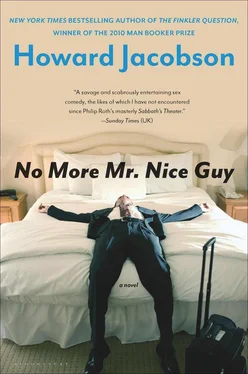All the service facilities on the motorway are full. The cars spill back out on to the slip road. Frank is bemused by this until he remembers that it’s still August. He is surprised that the summer hasn’t frittered itself away while he’s been in Cheltenham getting pale. No such luck. The proletarian crap-watchers are as hell bent on getting into their holiday togs as they were when he last paid attention to them back in Little Venice-on-the-Runnel. They queue, belly to buttock, smelling of burning car upholstery, at the all-day breakfast counter, counting the beans on one another’s plates. They’re suffering from Frank’s disease. A pity Mel isn’t here to put them right. They’re attacking themselves with food. Abusing their spouses with fried bread. Knocking their kids out with chips. We’re banning handguns, Frank thinks, but we’re keeping motorway food. He has tomato soup himself, which he spoons from a giant witch’s cauldron. Hot soup and croutons, just the ticket when it’s eighty-five degrees in the shade. Hot soup and croutons and tea, for which he hands over a ten pound note and from which he gets no change to speak of. Frank can never get over how expensive it is to be poor. How the poor can afford to be poor beats him. But there they are again, paying for their petrol and crisps and make that a roll of scratch-cards while you’re at it, duck. When Frank was a boy he used to play abstract noun I-spy in the back of his parents’ car. That was before he borrowed it to ferry whores in. I spy with my little eye something beginning with C … Conundrum — I win! Now, in-car entertainment for kids is a roll of scratch-cards and a coin. They’are our Damien, just shut ya trap and see if you can win us a hundred grand. Frank sees them rubbing and scratching in toddler-seats, their baby fingers smeared with silver, all the way down the motorway. No wonder, he thinks, that the whores of today are so mercenary.
He comes off the motorway at Bridgwater and pootles reflectively into Nether Stowey. Welcome to Coleridge country. How long before Biographia Literaria makes it on to the box? In his own way he is as sentimental a journeyer as any pilgrim to Coronation Street. He too likes to plug into the presiding genius of the place. For many years he has meant to come and stay in the Quantocks, put on red socks and walking boots and follow the paths that Coleridge and the Wordsworths took, tracking the course of streams, listening to rivers, recording starlight, reciting poetry in echoing groves. He communicated this desire to Mel in their early days. ‘Think of it,’ he said, ‘no car, just you and me and the ghosts of Wordsworth and Coleridge, lost among the deep romantic chasms. We could walk all day among the waterfalls, not see a single soul, fall into a pub for dinner, drink honey-dew, then stumble into bed under a waning moon, listening to the big sea.’
‘So let’s do it,’ Mel said.
She was so prompt then. So spirited and agreeable. Up for anything.
They bought each other woolly walking pullovers and marbled notebooks, sharpened a dozen pencils, took a room in a guest house a hundred yards from Coleridge’s cottage and never got out of bed. It was too soon in their connection. The only deep romantic chasms that Frank had time for in those days belonged to Mel.
When they finally did get to walk in the west country it was at Mel’s instigation, and it was Daphne du Maurier’s west country, not Coleridge’s. Impatience had entered into it by then. Mel didn’t buy the cottage in Little Cleverley to celebrate their passion but to find an alternative to it. Frank was already making too much noise for her to take. ‘If you’re going to come down to Little Cleverley with me,’ she warned him, ‘you’d better be prepared to have quiet thoughts. No running around looking for curries. No yelling at the telly. No London stuff.’ Among the hippy bits and pieces left behind by the previous sitting tenants was a parchment scroll on which was transcribed that once inescapable consolation ode of the culturally damaged — GO PLACIDLY AMID THE DIN etcetera. Mel ripped off the etcetera and posted the words GO PLACIDLY above Frank’s side of the bed.
Now would be a good time for him to dump the car and walk the Quantocks, but he is too restless. He accepts that he will never do it. He blames the heat, the tourists, his commitments, but the truth is that he cannot face being alone in nature. How many bound notebooks has he bought in his life, for the purpose of recording his fortnight’s solitary expedition to Bronte country, Hardy country, Lawrence country? There they all sit, in a neat pile on the top of one of his bookcases, labelled, dated, paginated — addressed even, with the promise of a small reward should anyone find them forgotten under an ash tree by a fairy stream — but otherwise quite empty. Get wisdom? No, thank you. Frank’s got it and all that means is that he’s wise to himself. No more notebooks. No point. He’ll never fill them. He’ll never stay in a Quantock valley and walk the hills until his legs give out. He’d rather sit on the edge of a bed and watch crap on the box all day. Mel made him feel well but she never cured him. He still does what he hates, and hates what he does. Of course, if there were some girl who’d like to go hiking through the Quantocks with him, walk all day among the waterfalls, drink honey-dew, then stumble into bed under a waning moon … But this fantasy too can no longer survive the penetrating gaze of wisdom. He’s wise to himself. He don’t want no girl. He thinks he wants a girl because he’s been wanting one since he was six. It’s a long-time tic. What you’ve been wanting for as long as you’ve been conscious you can’t suddenly unwant. But when Frank puts his ear to the growling of his appetites he hears no clamour for a girl. Girls he’s had. So now what? What does wisdom have to say today on the question of what a man who has been booted out of his house is supposed to do with himself if he has no appetite for a girl? A long-time tic has lots going for it. It points you in the direction of what to do next. Frank’s longtime tic used to tell him that it was once again time to go and fuck a girl. If he no longer wants a girl, then what is he to fuck? He knows the answer to that, too. He isn’t to fuck anything. But he’s a man; the only truly passionate pursuit of his life has been fucking. There’s a mathematical necessity involved in this. M.A.N. = F.U.C.K. If he’s now to believe that a man of his age isn’t for fucking, then what the fuck is a man of his age for?
Do the sums. Show him the equation. M.A.N. = what?
He knows the danger. There’s no end to what you know once you become wise. He knows that he might end up following his long-time tic for the simple reason that he can’t come up with anything else to follow.
This is not something philosophers of society have adequately addressed or foretold. They’ve been too preoccupied with the economic and psychological consequences of redundancy and geriatric longevity. No one has come along and said we have a massive sociopathic crisis in the making here: a generation of men is about to enter middle age with no passion left for fucking who have not been schooled in any other purposeful activity. Frank can only speak as he finds; it would have been better for him, as a man suddenly booted out of a stable surrogate-for-fucking home situation, had he known of some re-training programme he could have entered.
Back up on the high road the country he has just left gets up to its old beguiling tricks. If you could only descend into those deep-bosomed hills, slip silently into that arboreous cleft, all would be well. The wispy woods would take care of your body, and the smoky churches would take care of your soul. To his right the big sea slopes away from him, too blue to bear. It is always a shock to him to look at the map and be reminded that this is still only the Bristol Channel and that that is only Wales on the other side of the water. That should be Peru over there. Or Troy. Or Xanadu.
Читать дальше












